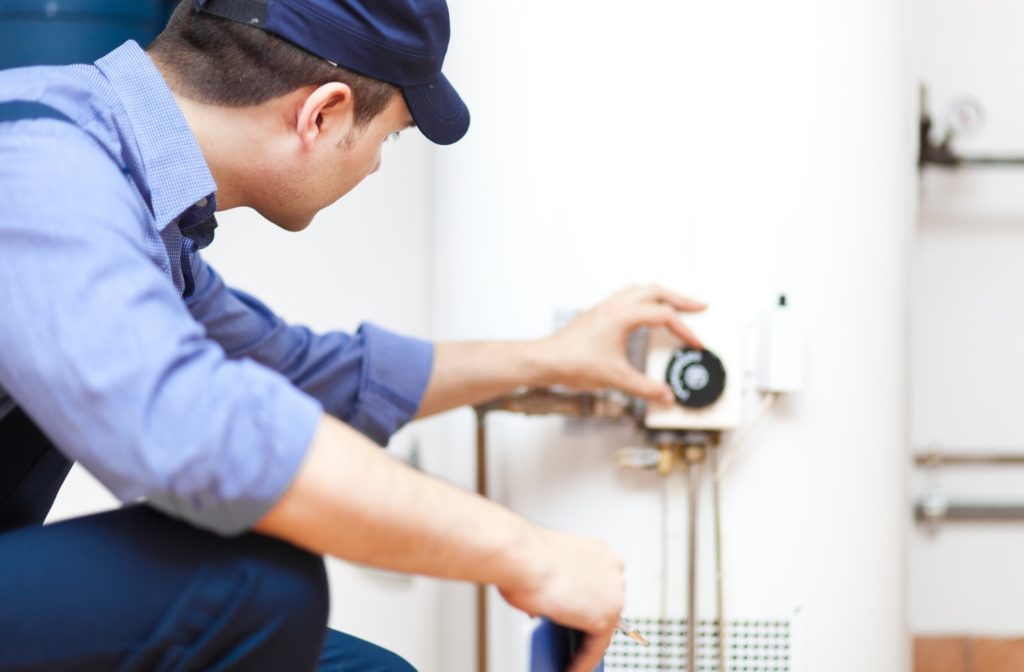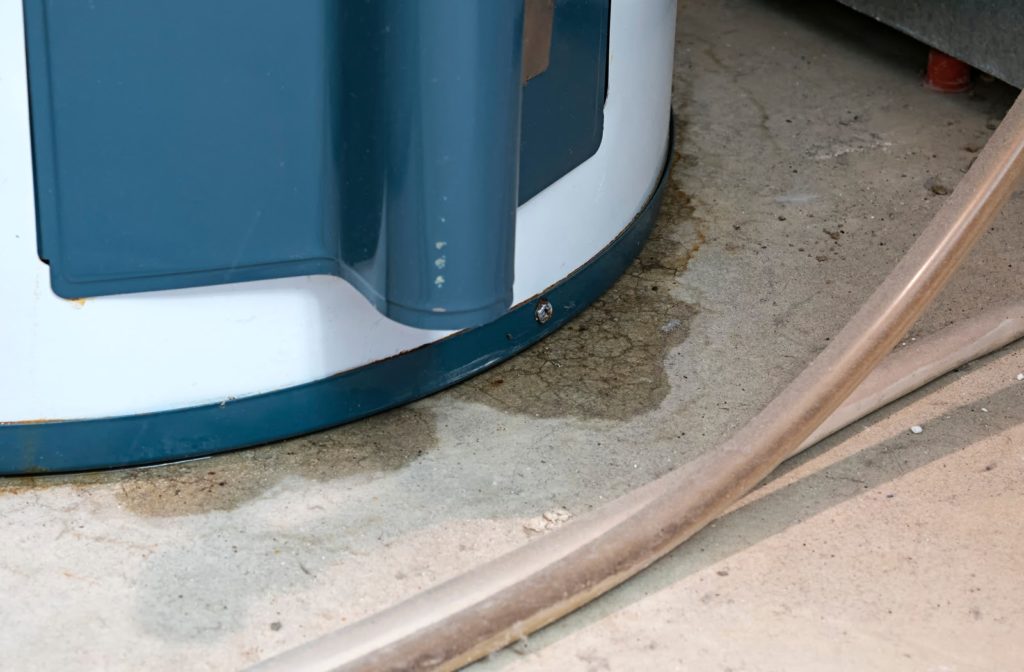Finding a puddle of water in your basement is concerning. While a tiny trickle of water might be easily mopped up, it could be a sign of a larger problem. If the leak is coming from your water heater, you’ll need to diagnose the problem and get it fixed.
Leaks left to drip may become costly. Subfloors and even drywall can be damaged by wayward water. When your water heater is responsible for the leak, there are some telltale places on the unit that water might be coming from.
Water heaters have plenty of components, many with the potential to spring a leak. Some of these component parts are much easier to fix than others—simple tightening of nuts and bolts may solve a slow drip.
But, if things get much more complicated than using a wrench, it might be time to call in a professional. Of course, you can always save yourself some stress by dialing a technician as soon as you notice a leak.
Let’s look at some reasons your water heater might be leaking.
Loose Drain Valve
Sometimes, a leaking drain valve is a sign of a failing water heater. But, it could also just mean that the valve itself needs to be replaced.
The drain valve is located at the bottom of the tank and is responsible for draining any sediment from the water heater. It might be leaking due to sediment buildup, a worn rubber gasket, or perhaps cracked plastic parts.
The valve might also just be loose and easily tightened with a wrench. Careful not to overtighten it if trying to perform a repair yourself though!
If you identify the drain valve as the source of the leak, never ignore it. Disregarding a leaking drain valve can cause the tank to empty out completely onto the floor. A professional can assist before that happens!
Is a Leaking Water Heater Drain Valve Dangerous?
A leaking water heater drain valve poses several risks, not just to the appliance but also to your home and safety. First and foremost, water damage is a significant concern. Continuous leaking can lead to moisture accumulation, which can damage floors, walls, and even the structural integrity of your home. In electric water heaters, there’s also the risk of electrical hazards if water comes into contact with electrical components.
Furthermore, a leaking water heater drain valve can be a symptom of too much pressure building up in the hot water tank. This pressure can cause not just leaks but also a rupture or explosion, posing serious safety risks. If you notice water leaking from any part of your water heater, it’s essential to address it promptly. Lee’s Air, Plumbing & Heating offers expert water heater services and leak detection in Fresno to help identify and resolve such issues safely.
Temperature & Pressure Relief Valve
The temperature and pressure relief valve is an important safety feature of the water heater. When the unit gets too hot or the internal pressure too high, the water heater can explode. Thankfully, this valve kicks in and prevents the worst.
When water leaks from the temperature and pressure relief valve, it can mean one of two things—the valve is doing its job and preventing overheating or overpressurization or the valve is faulty. Either way, this is a problem in need of a solution.
Frequent triggering of the temperature and pressure relief valve means a professional is needed to determine the cause of high pressure in the water heater. And, if it’s a faulty valve, it will need to be replaced.
Replacing the temperature and pressure relief valve is a common water heater repair, easily accomplished by experienced technicians.

Cold Water Valve
When water is leaking from the top of the unit, the cold water valve might be to blame. While it might not be creating a mess on your floor, water left sitting on top of the water heater could get into the electrical components and cause shorts.
The cold water valve allows for the heating of cold water entering the unit. A simple twist of the nut might be all that’s needed to quell the leak. But, if you tighten it and the valve is still leaking, it might be faulty and require replacement.
Tank Troubles
The water heater’s tank is the main portion of the unit that holds water. Sediment that builds up for years in the bottom of a water heater tank can lead to corrosion, allowing water to spill out onto the floor.
Cracks can also be the culprit. When water heats, it expands. Over time, this expansion can put stress on the tank and cause the unit to fracture.
Cracked and leaking tanks usually mean the water heater needs to be replaced. You’ll definitely need professional assistance with a full replacement.
How to Avoid Water Heater Corrosion
Water heater corrosion is a significant factor that can lead to leaks. In order to avoid this, regular maintenance is key. This includes checking and replacing the anode rod, which protects the tank from corrosive substances, and ensuring the water quality is suitable for your heater. Hard water, rich in mineral content, can accelerate corrosion and buildup inside the tank.
Additionally, maintaining the correct temperature and pressure is crucial. Too high a temperature or pressure can increase the rate of corrosion and lead to water heater leaks. Regularly checking the temperature and pressure relief valve and ensuring your water heater is not operating under excessive pressure can help prevent corrosion and extend the life of your water heater. Remembering to take a few precautionary measures can help you avoid a leaky water heater in the long run.
Internal Shell Issues
If you have a leaky water heater, it’s important to look beyond the external components, like the drain valve. The internal shell of the water heater can also be a culprit. Cracks or corrosion within the internal tank can lead to water leaking. These issues are often a result of age, poor water quality, or lack of regular maintenance. If your water heater tank’s internal shell is compromised, you’re likely facing a more serious issue that may require a water heater replacement.
To identify internal shell issues, look for signs of water leaking from the body of the heater. Water stains or corrosion on the external shell can be indicative of internal damage. Regular inspections and preventative maintenance, which typically include checking anode rods and cleaning the tank, can prolong the life of your internal shell.
When Is Replacement Necessary for a Leaky Water Heater?
Determining when to opt for a water heater replacement can be challenging. Minor issues, like a leaking water heater drain valve or loose inlet connections, can often be repaired. However, if your water heater is old or the leak originates from within the tank, a replacement might be more cost-effective.
Leaks due to cracks in the tank or severe corrosion often signal the end of your water heater’s lifespan. In these cases, investing in a new water heater is not just a repair but an upgrade to your home’s efficiency and safety. Remember, timely replacements can prevent further damage and save on energy costs in the long run.
If you’re facing a leaky water heater and unsure about the next steps, consider contacting Lee’s Air, Plumbing & Heating for expert advice and service. We specialize in water heater replacement in Sacramento and can guide you on whether a repair or a complete replacement is necessary.
Professionals Can Help Repair & Replace
Safety is paramount and before you investigate the source of water heater leaks, you should turn off the power to the unit. Doing so helps prevent any electrical damage to the unit—or harm to yourself.
Once you’ve determined the origin of the leak, decide whether it’s a job for a simple twist of a wrench, or if it’s a more complex problem. If you’re not sure, get in touch with technicians who can help.
Leaving tasks to the pros can help save money in the long run—they’ll be able to identify and fix problems right away, before any more damage happens from leaking water.
If you do need to replace your water heater, a tankless option might be the way to go—they don’t store water and they tend to leak much less. The trusted team at Lee’s Air, Plumbing, & Heating can recommend the best course of action for your home!

